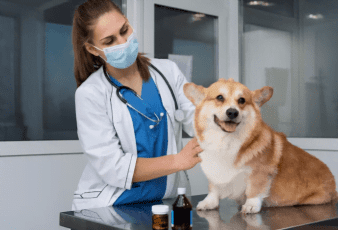There can be many reasons why a dog is throwing up, but the most common reason is that the dog has eaten something that disagrees with its stomach.
Dogs will often vomit as a way to get rid of whatever they don’t like in their stomachs. Also, you might see your dog out in the yard eating grass as a means of trying to induce vomiting.
If you are like many dog owners, you might frequently be asking the question: Why is my dog throwing up? There are several reasons why your dog might be throwing up; however, if your dog is frequently vomiting or if there is blood in the vomit, it is important to take them to the vet to find out what might be wrong.
3 Ways To Prevent Dog From Vomiting
If your dog is vomiting, it’s important to try to stop it as quickly as possible to prevent dehydration. Keep reading to learn how to try to prevent your dog from vomiting.
1. Limit water to 30 minutes before and after eating.
There are a few reasons why you may want to keep your dog from drinking water 30 minutes before or after eating. First, if your dog drinks too much water right after eating, it may vomit because the food will dilute its stomach acids and make them more likely to regurgitate.
Additionally, if your dog drinks water while they still have food in its stomach, it can cause digestive problems as the two liquids will mix together and create an upheaval in the stomach. This can lead to vomiting, diarrhea, and other gastric issues. If your dog is throwing up or has a problem with vomiting after eating, you might consider keeping your dog from drinking water 30 minutes before and after meals.
2. Consider changing your dog’s diet
There are many reasons why dogs vomit, but one of the most common is diet-related. Dogs who eat too fast, consume too much food, or drink water immediately after eating can be prone to vomiting. In some cases, dietary changes can help stop a dog from vomiting.
If your dog vomits frequently, it’s important to take him to the veterinarian to rule out any underlying health issues. Once your vet has cleared your pup for a change in diet, you can start making small tweaks. For example, if your dog gobbles down his food too quickly, try spacing out his meals throughout the day instead of feeding him one large meal.
You can also try adding some wet food to his diet to make it more palatable and slow him down. Additionally, you might consider switching dog food brands or types. Be sure to work with your vet on proper nutrition and feeding habits for your pup.
3. Think about over-counter-medication.
If you think your dog’s vomiting is being caused by something they ate, you can try giving them an over-the-counter anti-vomiting medication like Pepto-Bismol or Pedialyte. You can also try withholding food from your dog for 12 hours and then slowly reintroducing small amounts of bland food such as boiled chicken or rice until their stomach settles down again.
It is important that you work closely with your vet if vomiting becomes a large issue, as there could be something else wrong. Also, it’s important that you ask your vet about any medicine before you give it to your pup.
In general, if your dog is vomiting, it is likely because he or she isn’t feeling well. There are a variety of reasons why a dog might vomit, and some causes are more serious than others. However, regardless of the cause, it is important to get your dog the help it needs to stop vomiting and start feeling better.
Additionals:





























